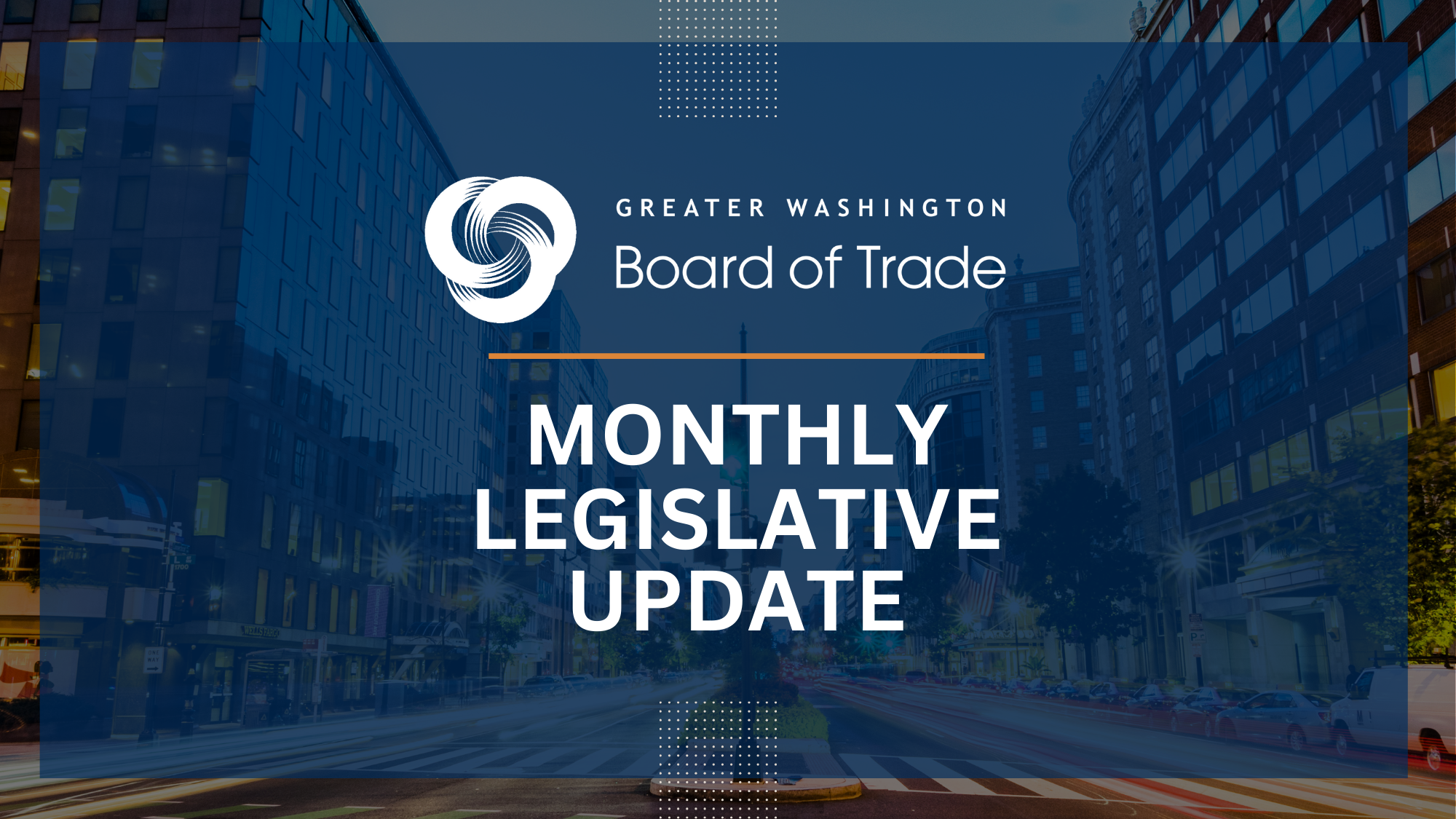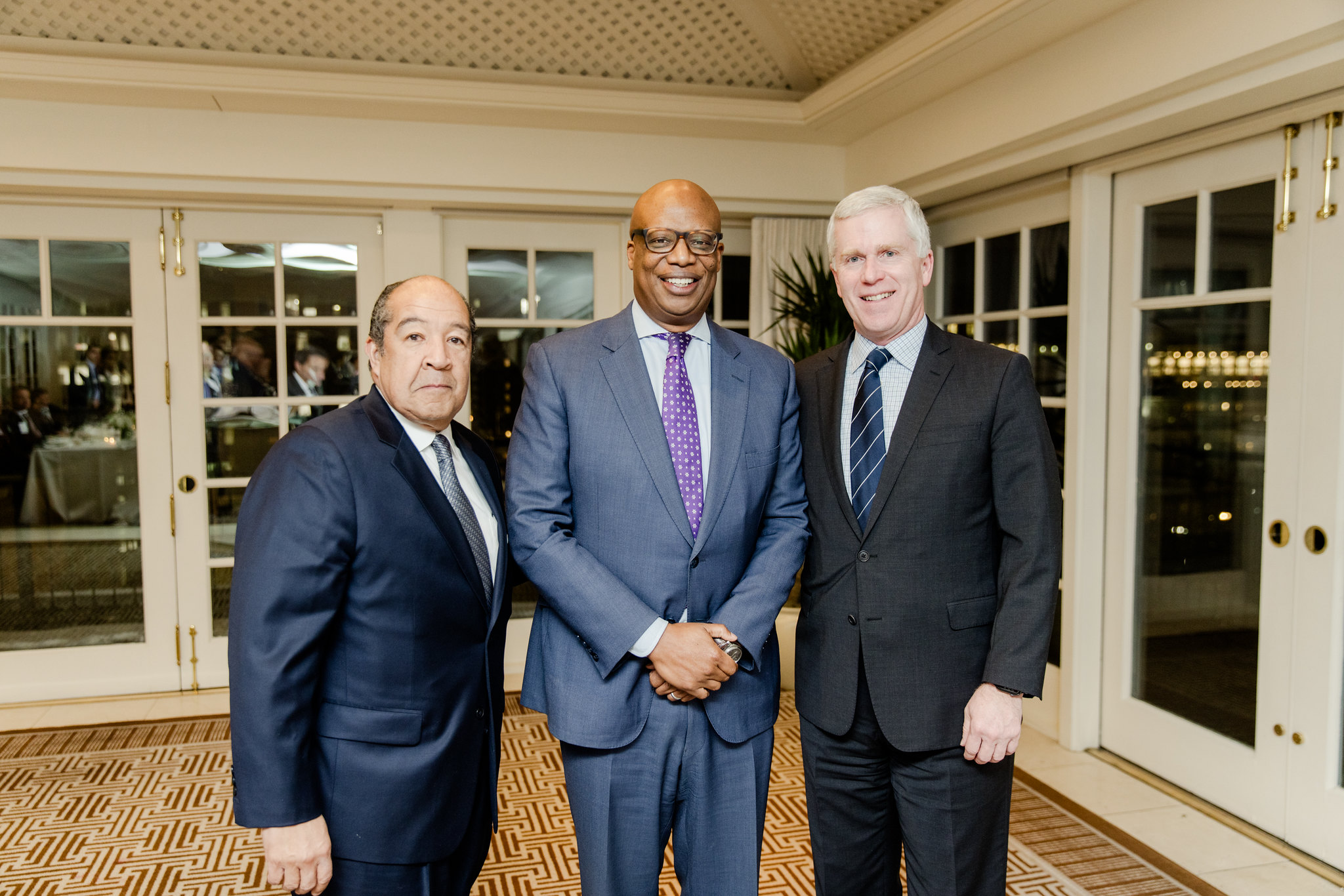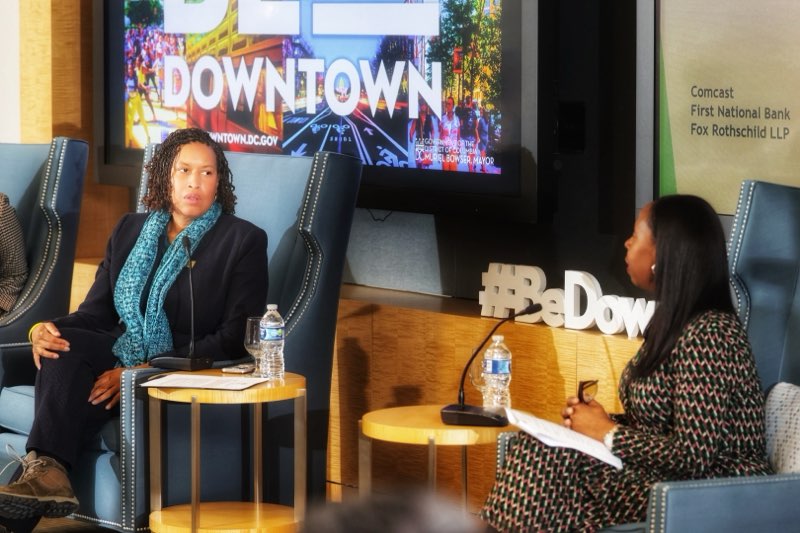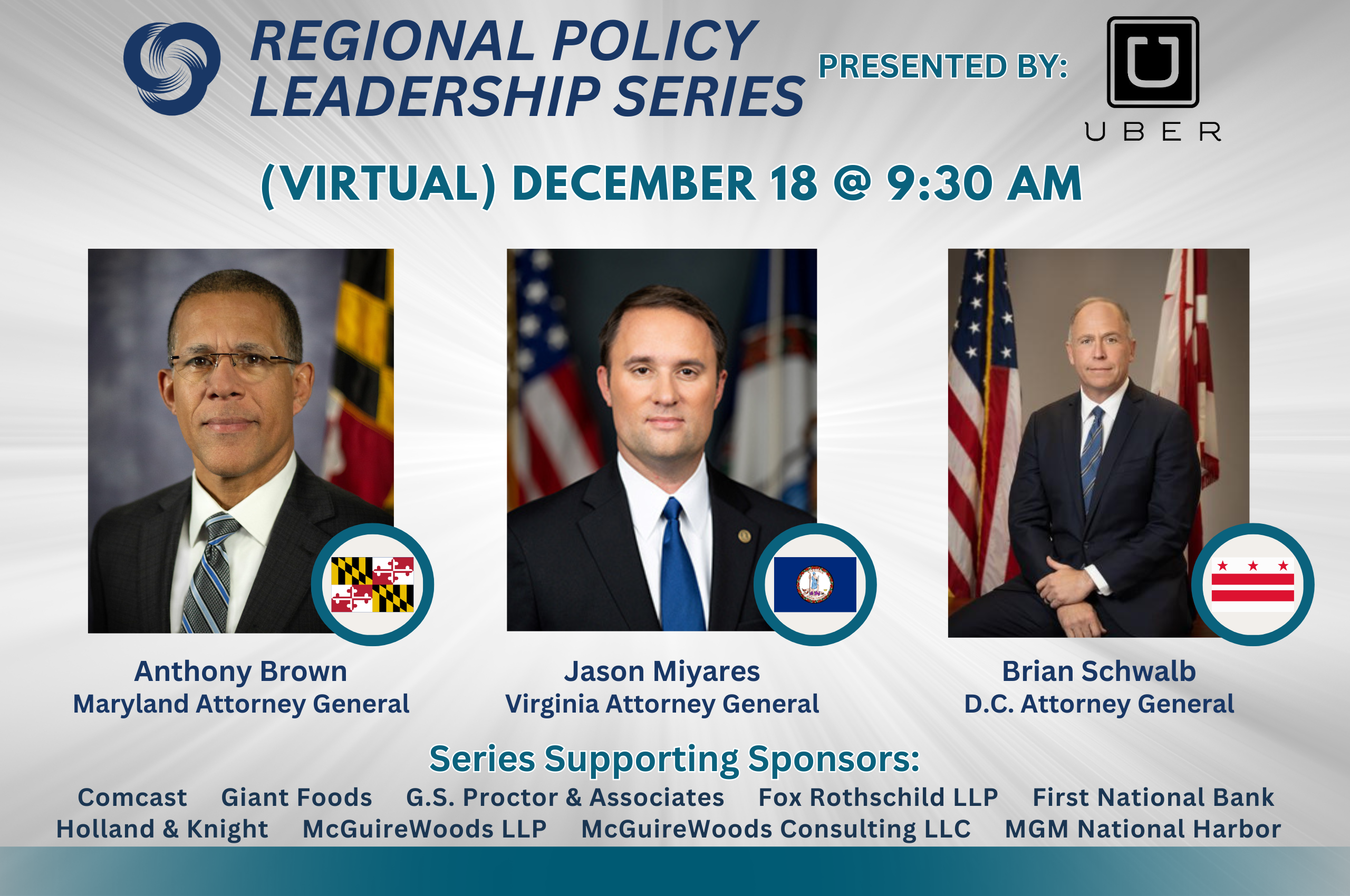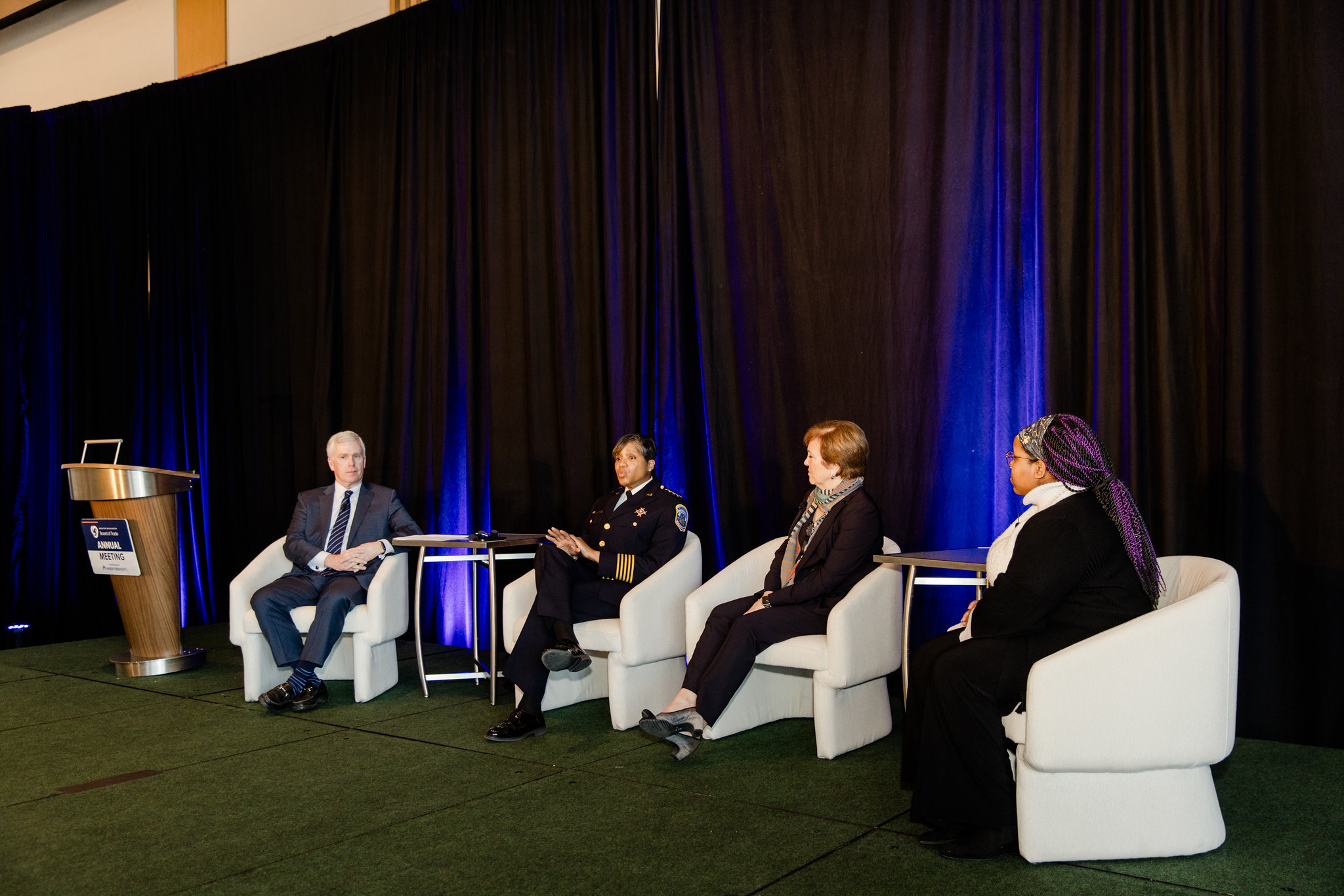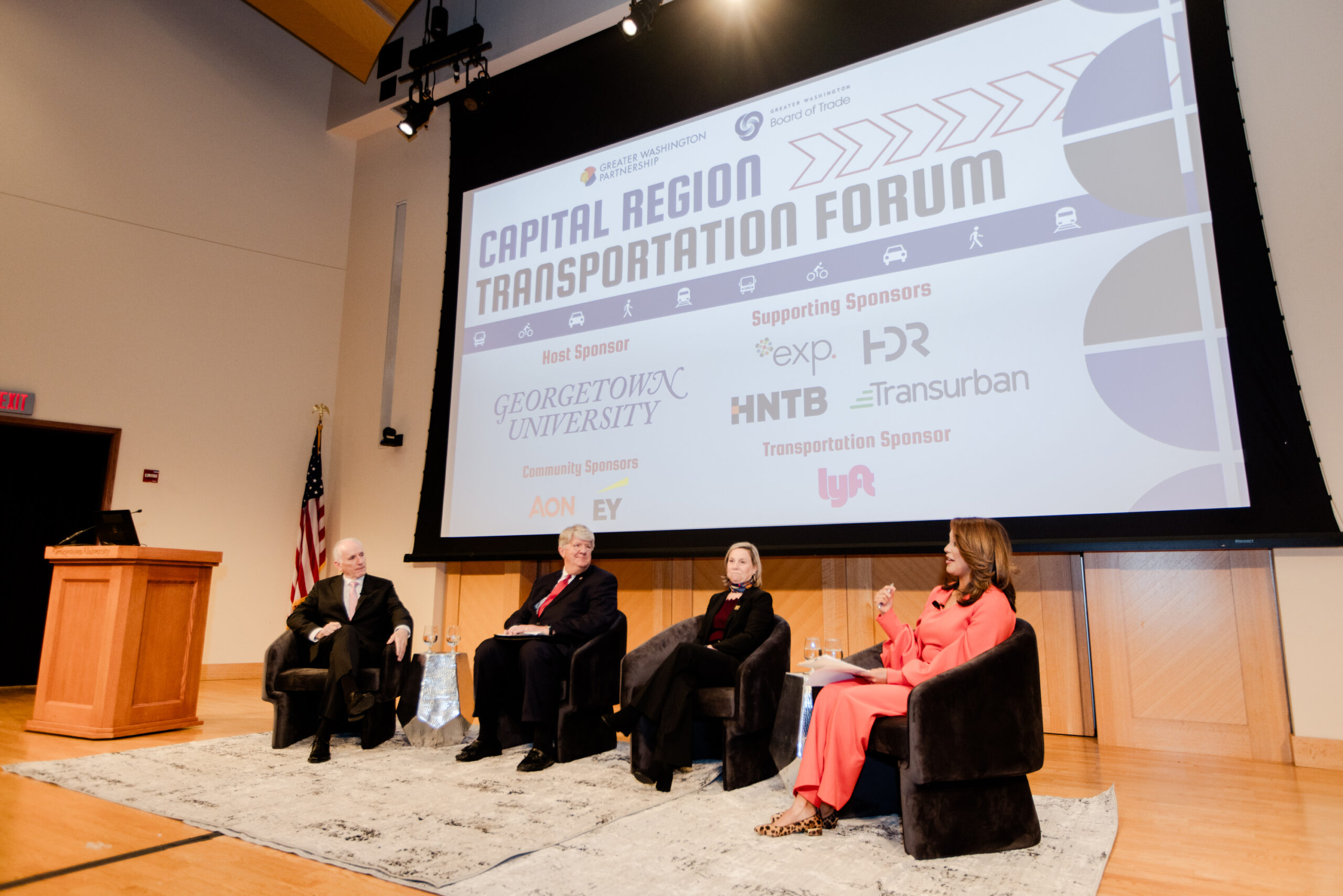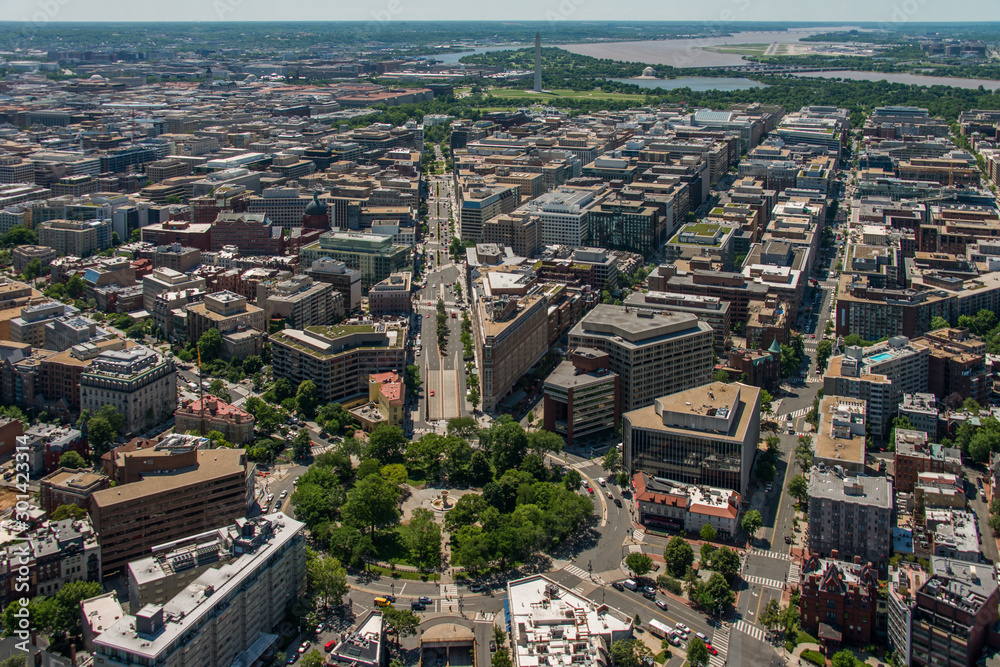The Board of Trade’s advocacy, convening, and thought leadership activities support regional outcomes that will help Greater Washington grow and adapt for generations to come. The GWBOT Legislative Update shares legislation and policy insights from the Greater Washington region.
Category: Latest Updates
Board of Trade honors Jermaine Johnson at Annual Chair’s Dinner
Each year, the Board of Trade celebrates our recent past-chair in an evening of reflection, stories, and laughter with board colleagues, coworkers, family, and friends. We had the pleasure of holding our Annual Chair’s Dinner honoring 2023 Board Chair Jermaine Johnson, Regional President, Greater Washington & Virginia at PNC, on Jan. 23 at the Hay Adams Hotel.
The intimate gathering provided a moment of reflection as we dive into 2024, offering heartfelt gratitude to Jermaine for his exceptional leadership, unwavering integrity, and tireless dedication to our organization. His invaluable contributions have been instrumental in achieving our goals and advancing the mission of supporting the region’s business community.
Board members Steve Proctor (2024 Board Chair), Tony Pierce, Tim Gillis, Courtney Spaeth, and our president Jack McDougle shared their personal experiences with Jermaine during his term as Chair and celebrated the ongoing work of the Board of Trade. Poised as a compassionate problem solver, Jermaine’s legacy will be stamped on the Board of Trade’s progress in addressing critical issues such as Metro funding, public safety, downtown revitalization, and overall regional growth.
“Jermaine has been a steady presence within our organization’s leadership for years and has served during some of the most challenging times we’ve faced as a region and business community,” said Jack McDougle. “I am very proud of this organization and where we are today. Thank you, Jermaine, for your leadership and your friendship. The Board of Trade is as strong now as it has been in decades.”
Tim Gillis highlighted Jermaine’s character as “So humble. So genuine. So real. So effective.” capturing in just a few thoughtful words Jermaine’s impact on the community.
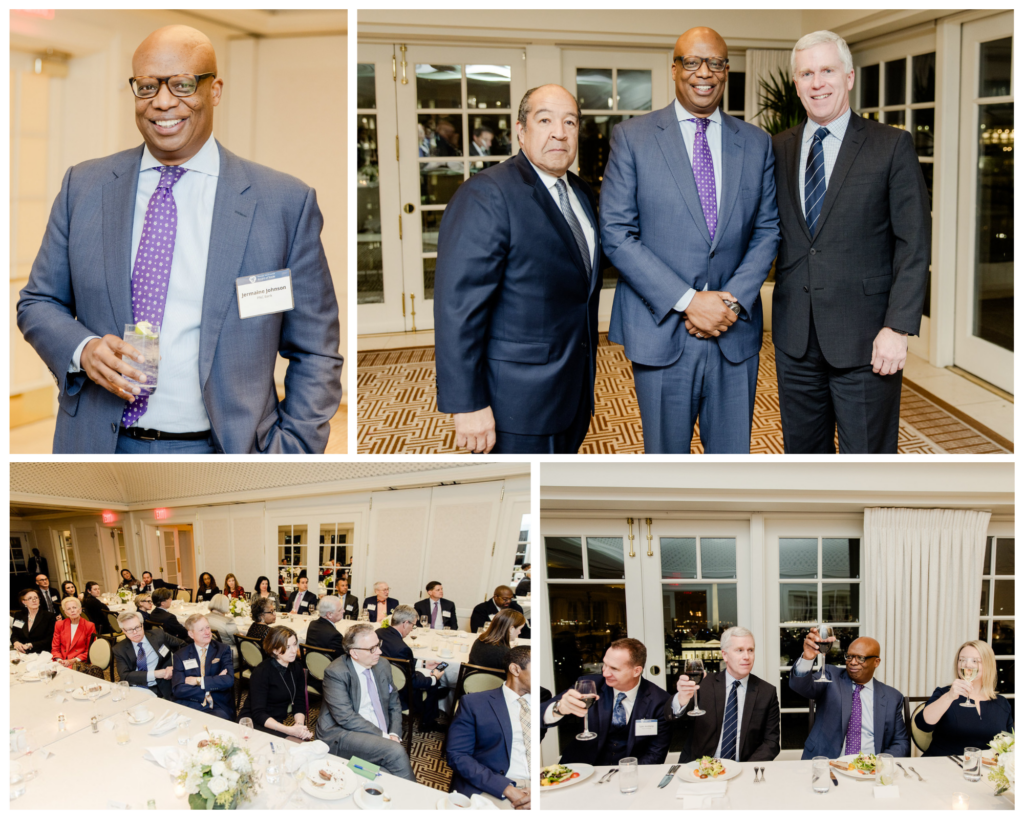
Click here for more photos from our Annual Chair’s Dinner
Jermaine thanked his children and wife, Rae Ann, for joining this celebration and joked he wished his senior executive team had been in attendance to hear some of these accolades! He closed out the evening, sharing his pride in the organization and its role in our community, and promised continued commitment to building a better region for all.
“The Board of Trade has always been a conduit of institutions, and it has truly been an honor for me to serve as an officer of this organization for the last five years,” said Jermaine. “Our executive committee should be applauded for their work supporting all the great things we did in 2023.”
Jermaine, your exceptional leadership and genuine authenticity have made this past year remarkable. As you join the Board of Trade’s Senior Council, your wisdom and mentorship will continue to be invaluable. Your dedication, alongside that of our fellow board members, is instrumental in supporting the Greater Washington business community.

Mayor Bowser addresses regional business leaders through engaging conversation on important issues facing Washington DC
The Greater Washington Board of Trade’s Regional Policy Leadership Series (RPLS) brought Washington DC Mayor Muriel Bowser together with the region’s business community for an intimate in-person conversation in the heart of the Central Business District to discuss regional issues. Mayor Bowser’s discussion bridged regional transportation, public safety, regulation of new disruptive technologies, downtown revitalization, and what can be done to better the District’s business environment as the post-pandemic economy continues to evolve.
The conversation was presented in sponsorship by Holland & Knight and was held at the Downtown DC office of the multinational law firm located on 17th Street NW. It set the perfect backdrop for the important conversation Mayor Bowser had with the discussion’s moderator Janene D. Jackson, Partner at Holland & Knight’s DC office.
The event began with remarks from Nina Albert, DC’s Deputy Mayor for Planning and Economic Development, who addressed the audience on some of the key pillars to revitalization of the Central Business District. She also discussed the next steps in creating a continued high growth economy, promoting cultural experiences that make DC unique, and creating more affordable housing, ahead of Mayor Bowser’s discussion.
Mayor Bowser didn’t waste time diving into issues vital to the region’s business community, including the future of Metro funding from the District (engaging on the WMATA budget deficit impacting regional transportation) and newly introduced crime legislation which takes major strides toward providing law enforcement with the tools that they need to combat the epidemic of crime facing the region (including major public safety concerns in the Central Business District). On the latter of which, she expressed concerns regarding the defunding of the DC Police force by the federal government that has impacted the District’s public safety, reducing the standing force by 300 officers.
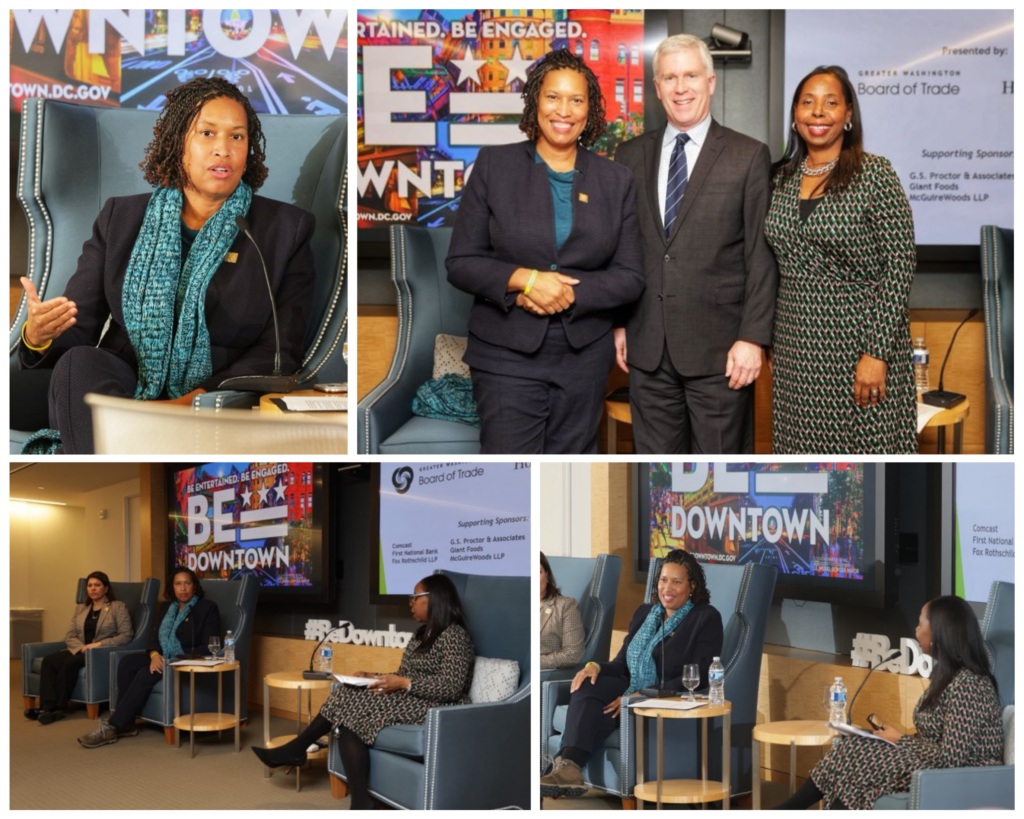
Mayor Bowser’s discussion also covered technological investments that will better position the region’s workforce to contend with competitor cities nationally and internationally. Federal dollars to extend broadband and internet connectivity in the District have helped tremendously to expand and upgrade infrastructure. She spoke specifically about the Internet Essentials Partnership Program and how this public-private partnership with internet service providers like Comcast has connected families and small businesses in underserved District communities to broadband internet. The mayor shared that “while everyone can connect to the internet, not everyone can afford to connect,” and it’s partnerships like these that elevate our region.
Mayor Bowser briefly covered the effort to try and keep the region’s professional sports teams in the District, including her hopes of retaining the Wizards and Capitals, whose parent company, Monumental Sports, recently released plans of moving the teams to a new entertainment district in Northern Virginia’s Potomac Yard. The mayor has worked with DC Council to approve a $500 million arena refurbishment funding package.
Conversation then turned to wooing the Commanders back to a new stadium in the District at the site of the old RFK Stadium in Northeast DC, a 10-year long campaign thus far with the federal government, which owns the site. Plans still involve building a new “NFL-sized” stadium at that location regardless of the Commanders’ plans, which would help the District hold larger concerts and outdoor events that currently cannot be held in DC due to the smaller size of some of its entertainment venues.
Now in her third term in office, the most difficult term for any mayor, Mayor Bowser was asked how she sees her legacy, looking back through her tenure making her the second longest-serving mayor in DC’s history. With so much to be proud of it’s hard to choose any single accomplishment, she pointed to her ability to uplift communities in Ward 8 via affordable housing, through the building of a new hospital and creating meaningful jobs in DC’s most challenging ward from an economic and equity standpoint.
This is the first RPLS event of 2024. We look forward to continuing to connect the business community to information directly from policymakers through our Regional Policy Leadership Series, ensuring that our members have the best up-to-date knowledge about how the region’s governments are planning for and reacting to a constantly changing environment.
Special thanks to our presenting sponsor: Holland and Knight LLP, and our series supporting sponsors Comcast, First National Bank, Fox Rothschild LLP, G.S. Proctor & Associates, Inc., Giant Food LLC, MGM National Harbor, and McGuireWoods LLP, McGuireWoods Consulting, and Uber Technologies, Inc.

GWBOT January 2024 Legislative Update
The Board of Trade’s advocacy, convening, and thought leadership activities support regional outcomes that will help Greater Washington grow and adapt for generations to come. The GWBOT Legislative Update shares legislation and policy insights from the Greater Washington region.
Read our January 2024 Legislative Update here
Where our Policy & Advocacy team is focused heading into a busy 2024
The Board of Trade is excited to begin 2024, expanding upon previous years’ work with new and varied policy and advocacy efforts. In 2023, we substantially expanded its policy footprint in the region by adding staff members Kyle McColgan, SVP of Policy, and Tyler Kirby, Policy Analyst, in addition to Daniel Flores, VP of Government Relations. In the coming year, the Board of Trade will be bringing Holland & Knight on board to represent the Board of Trade in the District of Columbia in a continuation of 2023’s efforts working with McGuireWoods Consulting and G.S. Proctor & Associates in Virginia and Maryland respectively. We worked to expand upon its convening role through programs like the Regional Policy Leadership Series and the Capital Region Transportation Forum, which brought together transportation leaders from across the region in conversation with our members, facilitating regionalism and collaboration between the private and public sectors to address concerns around talent acquisition and retention and the long-term viability and sustainability of public transportation.
The coming year will see the Board of Trade focus on fostering regional collaboration and cooperation to overcome mounting funding difficulties within the region, allowing for necessary changes that will preserve and better the business environment. Only through addressing the interrelated issues of crime, downtown revitalization, and the success and long-term sustainability of regional public transit will the region’s unrivaled resources, especially the quality and size of its workforce and unique relationship with the federal government, continue to bolster the region, keeping it near the apex of the market.

The ability of the region’s business environment to compete with emerging competitor cities around the nation rests on the ability of its jurisdictions to work together, not only with one another but with the private sector. Only through collaboration can the region address many of its endemic problems, now being brought to the fore as the world experiences unprecedented economic and political shocks and tectonic shifts, which fundamentally change the shape of the local, national, and international economies. As work from home becomes more engrained in post-pandemic work culture, the region must reimagine how commercial real estate incentivizes regional residents to remain in and move to the region’s core. Doing so will require a multimodal approach that addresses long-term funding issues for WMATA and significant road projects like the American Legion Bridge, distressing crime trends that depress tourism and recreation within the district, and necessary improvement to the region’s general business environment to incentivize investment and disrupt negative emigration trends among the most desirable young professionals out of the region.
With legislative sessions in Virginia and Maryland underway, the Board of Trade will continue to advocate for maintaining and improving the region’s business environment, connecting policymakers and leaders with one another and with the region’s business community. Collaboration across sectors, private and public, and across jurisdictional boundaries, remains necessary for this continued elevated status of the Greater Washington region, nationally and internationally. Only through intersectoral and inter-jurisdictional communication can we expect a risk-averse and sometimes slow-moving region to adapt to the new, constantly changing environment, and maintain its appeal and competitiveness relative to the nations and the world’s emergent competitor markets.
Looking into 2024: Board of Trade updates in the new year!
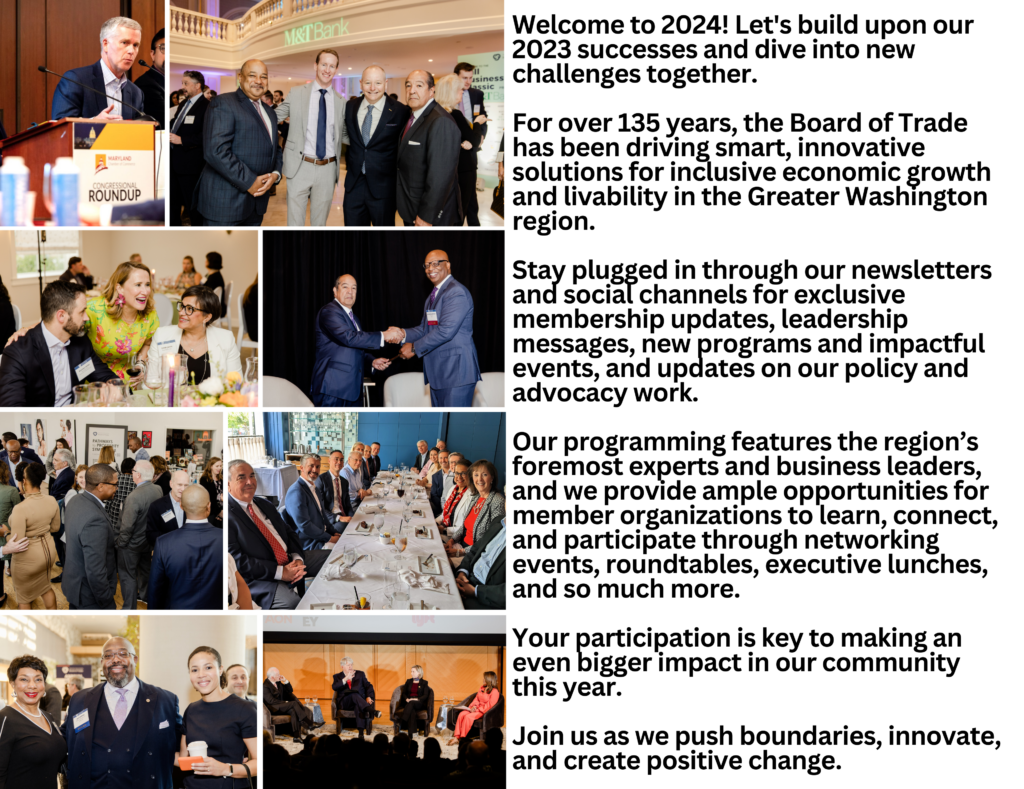
OFFICERS & NEW MEMBERS
2024 Officers
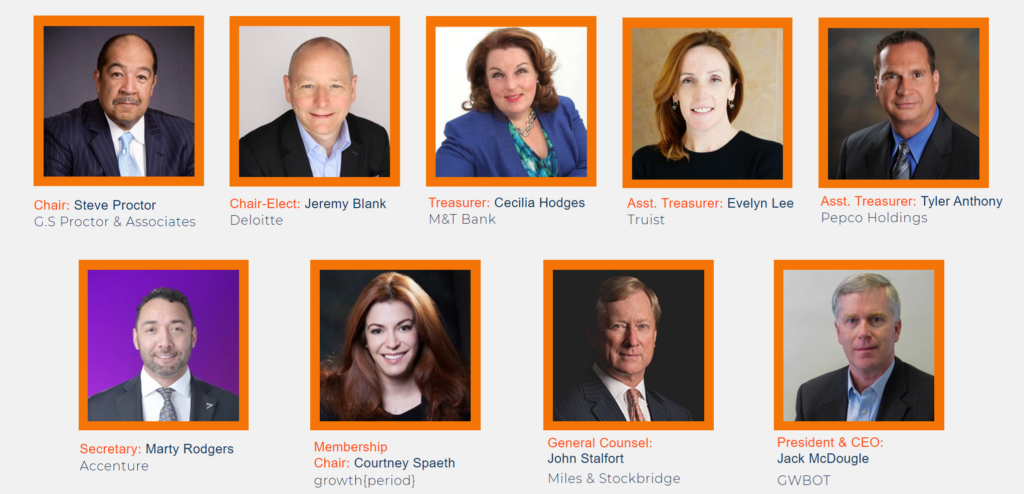
Meet our 2024 Board of Trade officers! At the forefront is Steve Proctor, President and CEO of G.S. Proctor & Associates, who steps into the role of 2024 Board Chair. Together with Steve, this dynamic leadership will continue to guide the Board of Trade as we navigate new intricate and rewarding challenges, promising higher impact and a strengthened network within our community. Embracing these hurdles with the same vigor that defines us, we’re geared up to tackle them head-on, leveraging our experiences and collective strength to make an even greater difference.
See our full list of Board Members here
New Members
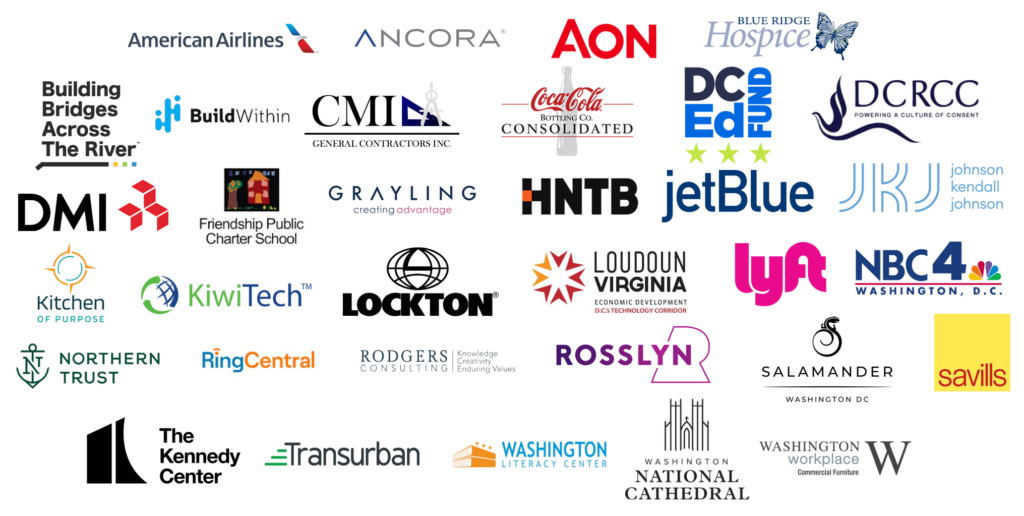
In 2023, we welcomed over 30 esteemed organizations, enriching our community and elevating the Board of Trade to new heights. As we anticipate the exciting opportunities of 2024, our existing members are integral to our success. If you know of an organization that should be part of this thriving community, take action! Reach out today to explore the benefits of joining the Board of Trade community.
See our full list of Member Organizations here
NEW EVENTS & PROGRAMMING
Mid-Winter Dinner at Washington National Cathedral
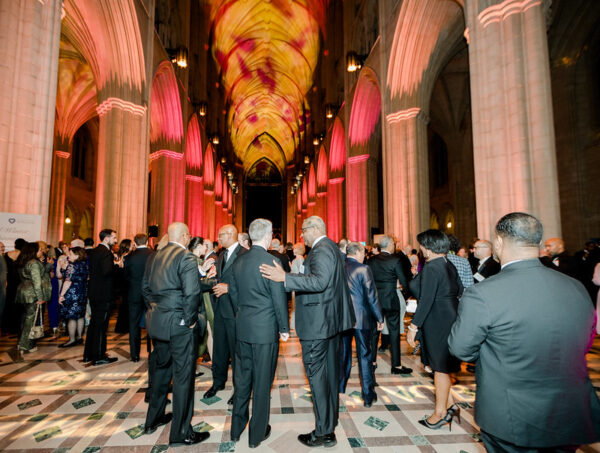
Join us on March 13 at the Washington National Cathedral for our premier event, the 104th Mid-Winter Dinner, presented by PNC Bank. This exclusive black-tie event is your chance to connect with business, government, and community leaders outside the office. Experience a pre-dinner cocktail reception, followed by a seated 3-course dinner, creating valuable connections with key players in the region. Don’t miss this extraordinary night of camaraderie and collaboration – secure your spot now and elevate your presence at the heart of the action!
Regional Policy Leadership Series kicks off with DC Mayor Muriel Bowser
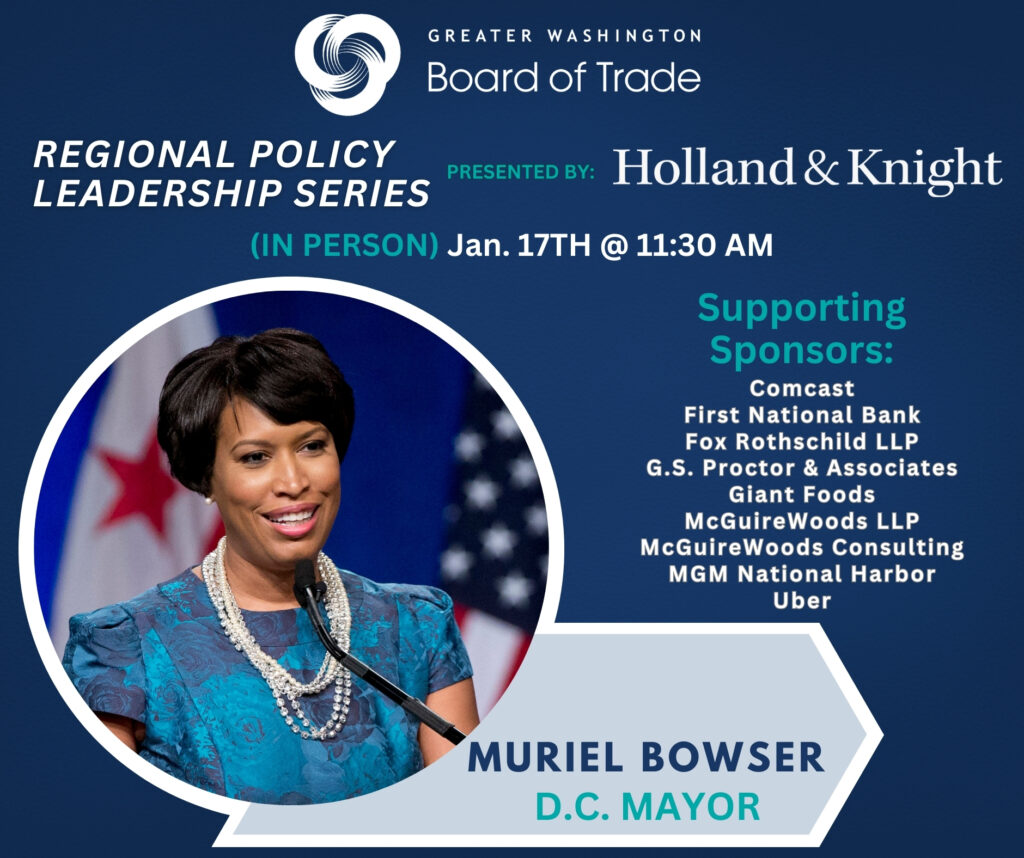
We are pleased to welcome Mayor Muriel Bowser next week at our in-person Regional Policy Leadership Series event on January 17. Join us for a thought-provoking discussion addressing critical issues within DC’s Central Business District. Mayor Bowser will delve into pressing topics such as efforts to enhance public safety, WMATA’s budget-related impacts, and the ongoing challenge of downtown revitalization amidst the prevailing work-from-home dynamic affecting businesses in the District.
EVENT CALENDAR: View more events and professional opportunities
DID YOU MISS THIS?
Annual Meeting Recap
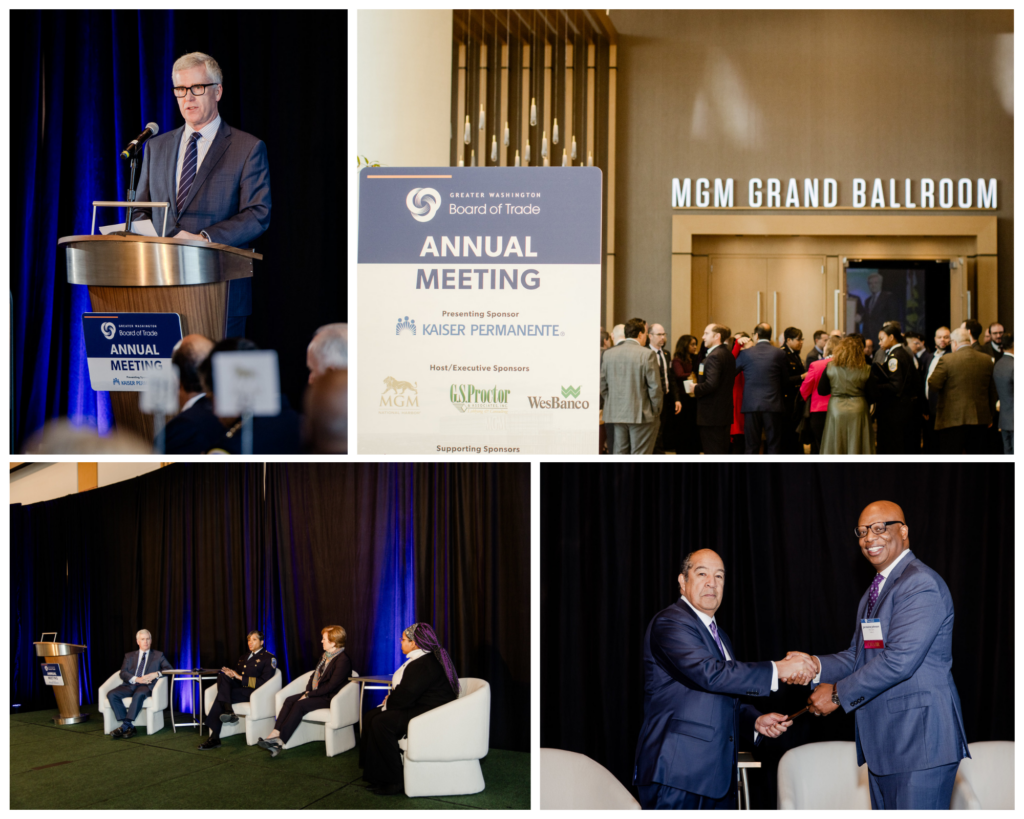
The Board of Trade’s 2023 Annual Meeting at MGM National Harbor was a resounding success! Our outgoing chair, Jermaine Johnson, and 2024 Chair, Steve Proctor, outlined some noteworthy highlights, such as a remarkable 90% member retention rate, an expansion of policy efforts, and strategic plans to address the significant funding gap for WMATA. Presenting sponsor Kaiser Permanente’s Ruth Williams-Brinkley shared their alignment with the Board of Trade and our mutual mission to build healthy communities. Deborah Rutter of the Kennedy Center emphasized the pivotal role of the arts in public safety, featuring discussions on its economic impact and community well-being. A compelling table read from ‘Enough: Plays to End Gun Violence,’ crafted by playwright Niarra C Bell, ignited a panel on crime prevention with MPD’s Chief of Police, Pamela Smith. As we approach 2024, our focus remains on tackling new challenges, advocating fervently, and implementing targeted initiatives to keep our region competitive, engaged, and inclusive.
Click here to read more about this impactful event
Regional Attorneys General
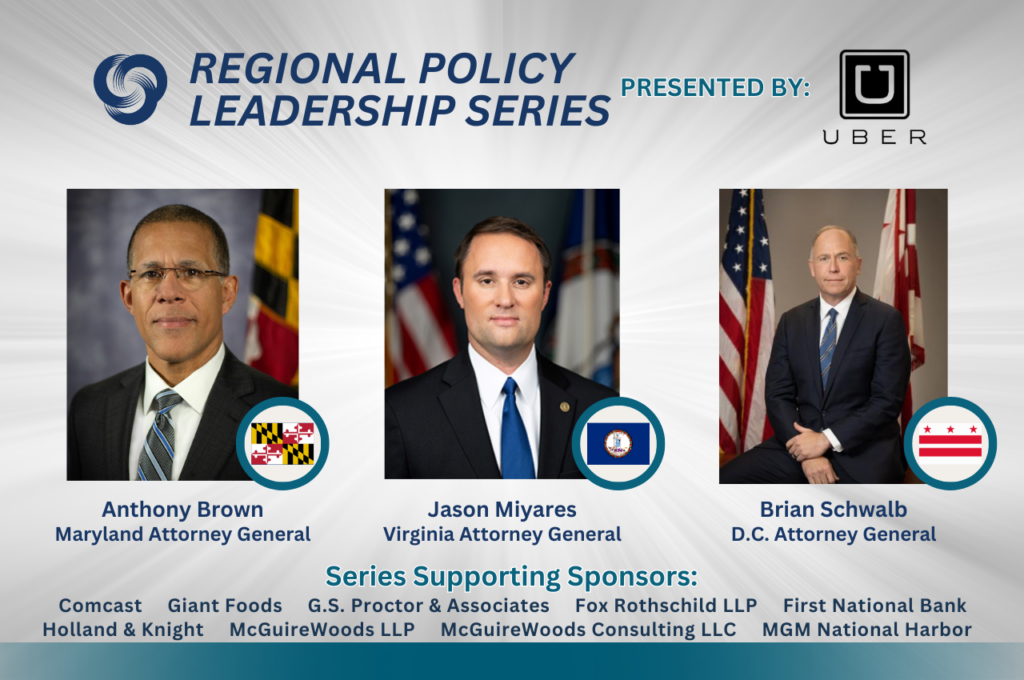
The Board of Trade brought together the Greater Washington region’s attorneys general in mid-December to discuss important issues and topics surrounding Washington D.C., Maryland, and Virginia. Topics ranged from the ongoing Meta lawsuit, the impacts of artificial intelligence, and how our top legal officials in Greater Washington are combating the epidemic of crime in the region.
Regional Attorneys General Policy Discussion addresses Meta Lawsuit, AI Ethics, and Crime Solutions in Greater Washington
The Greater Washington Board of Trade’s Regional Policy Leadership Series brought together Maryland Attorney General Anthony Brown, DC Attorney General Brian Schwalb, and Virginia Attorney General Jason Miyares in discussion with Uber Technologies’ Senior Public Policy Manager Michele Blackwell about topics ranging from the ongoing Meta lawsuit and artificial intelligence to combating the epidemic of crime in the region.
AG Brown discussed key priorities around consumer protection and public safety, ranging from the Meta lawsuit and antitrust regulations to regulation around handgun qualification and addressing mass incarceration and recidivism, even indicating that he will be seeking to form a regional coalition among his colleagues on the call to create a task force in the mold of Illinois’ recent organized retail theft task-force to begin tackling the problem more holistically and collaboratively across the region.
In the way of consumer protections, Brown delved into antitrust legislation around minimum price setting in Maryland and expressed a commitment to continuing to pursue a collaborative relationship with the business focused on the prevention of abusive behaviors rather than over-regulation and litigation. Conversation then shifted to the Meta lawsuits being pursued by 41 attorneys general across the nation and the need for social media platforms and the tech industry to take age gating and verification seriously so that kids are protected from some of the tactics that have become a vital part of monetization of social media platforms.
In a discussion on violent crime, Brown pointed out that youth crime is actually on the decline with the very important exception of carjackings and gun violence and that wrap-around services in concert with a more pointed approach to prosecuting those crimes will be pivotal parts of any solution going forward. When asked how the business community can help, he suggested that continued investment in young people to get them off the streets and to inspire them with what their futures can look like through internship and mentorship will play a major role in preventing the cycle of criminality that plagues the region.
AG Schwalb primarily focused on DC’s Cure the Streets broad approach to combating violent crime in the District and consumer protections around the Meta Lawsuit, as well as the District’s proposed legislation regarding the use of AI algorithms in the making of important life decisions for residents.
Discussion of DC’s Cure the Streets program centered around the need to make people feel safe in the face of some disturbing trends around violence in the city. As the crimes associated with first offenses worsen and traditional prosecution has not seemed to be able to fix the problem, wrap-around services to keep children off the streets by providing after-school programs, jobs, internships, and mentoring may represent a viable path forward. Schwalb indicated that point as a way in which the business community is poised to get involved and have a major impact on both public safety and the lives of many of the District’s young residents.
Discussion of the Meta lawsuit and protection of DC’s youth from business practices that may negatively impact young minds transitioned into discussion of DC’s proposed regulations around the use of AI, big data, and algorithms in the making of important life decisions when Schwalb acknowledged the importance of balancing the major benefits that many of these technologies can bring to residents with concerns around the data privacy and data set biasing endemic to them. He expressed his office’s desire to create guard rails that will prevent the technology from going over the line and doing harm rather than opening up access to products and services to a broader scope of the population.
AG Miyares discussed, first, Virginia’s cease-fire program designed to combat gang violence throughout the state by intervening immediately within communities to avoid the retaliatory cycle of gun violence before it can begin and focusing on the prosecution of the disproportionately small number of repeat offenders, ~5%, who commit ~50% of crime in the Commonwealth. He, like his colleagues, pointed out that the business community can take a major role in preventing that cycle by providing pathways for young people to better themselves and develop relationships with the private sector, getting them out of bad situations associated with their being unsupervised after school and allowing them to envision themselves in positions and roles which may never have occurred to them.
Miyares then moved on to the discussion of consumer protections in the Commonwealth, again reiterating the need to provide age-appropriate guard rails for children on social media platforms while still allowing for the social connection that they so desire before moving into discussion of his recent opposition to the increasing of greenbelt fares, expounding on the AG’s office’s role as the voice of the people in issues of consumer protection within the Commonwealth.
Our Regional Attorneys General RPLS webinar was the last one of for 2023. During the 2023 year, we held six RPLS virtual policy discussions, including discussions with Virginia Governor Glenn Youngkin, Maryland Governor Wes Moore, Regional Police Chiefs and Regiona Labor Leaders from DC, Maryland, and Virginia.
In 2024, we look forward to continuing to connect the business community to information directly from policymakers through our Regional Policy Leadership Series, ensuring that our members have the best up-to-date knowledge about how the region’s governments are planning for and reacting to a constantly changing environment.
This Regional Policy Leadership Series webinar was presented by Uber Technologies. Supporting Sponsors of the event series are Comcast, First National Bank, Fox Rothschild LLP, Giant Food LLC, G.S. Proctor & Associates Inc., Holland & Knight LLP, McGuireWoods Consulting LLC, McGuireWoods LLP, and MGM National Harbor. Thank you for supporting the Greater Washington Board of Trade and our region’s business community.
GWBOT’s 2023 Annual Meeting highlights Growth, Arts Advocacy, and Community Collaboration around Public Safety
The Board of Trade’s 2023 Annual Meeting, presented by Kaiser Permanente, was held on Dec. 12 at the MGM National Harbor Resort in Oxon Hill, Maryland, and recapped a year of growth for the Board of Trade. The meeting brought together nearly 300 members of GWBOT to celebrate recent accomplishments, look at the year ahead for the organization, and discuss the importance of the arts to the Greater Washington community, specifically in the context of violent crime, as it has become such a prominent area of concern in the region.
From the Stage:
Board of Trade President & CEO Jack McDougle, outgoing Board Chair Jermaine Johnson, and incoming Board Chair Steve Proctor started with discussions of what the Board of Trade has accomplished over the past year and where they see the organization moving over the next. This included sharing a 90-percent member retention rate for 2023, the growth of our policy and advocacy department to push forth and make an impact on our members’ positions in the region, how we will work with our partners to address the critical $750 Million funding gap for WMATA/METRO, and how we will continue to address growing public safety issues for regional businesses. The annual meeting also allowed a vote to confirm the upcoming GWBOT Board of Directors and introduce new 2024 Board Officers as part of the excitement for our organization heading into the new year and how we can enhance our impact, grow membership, and maximize member engagement.
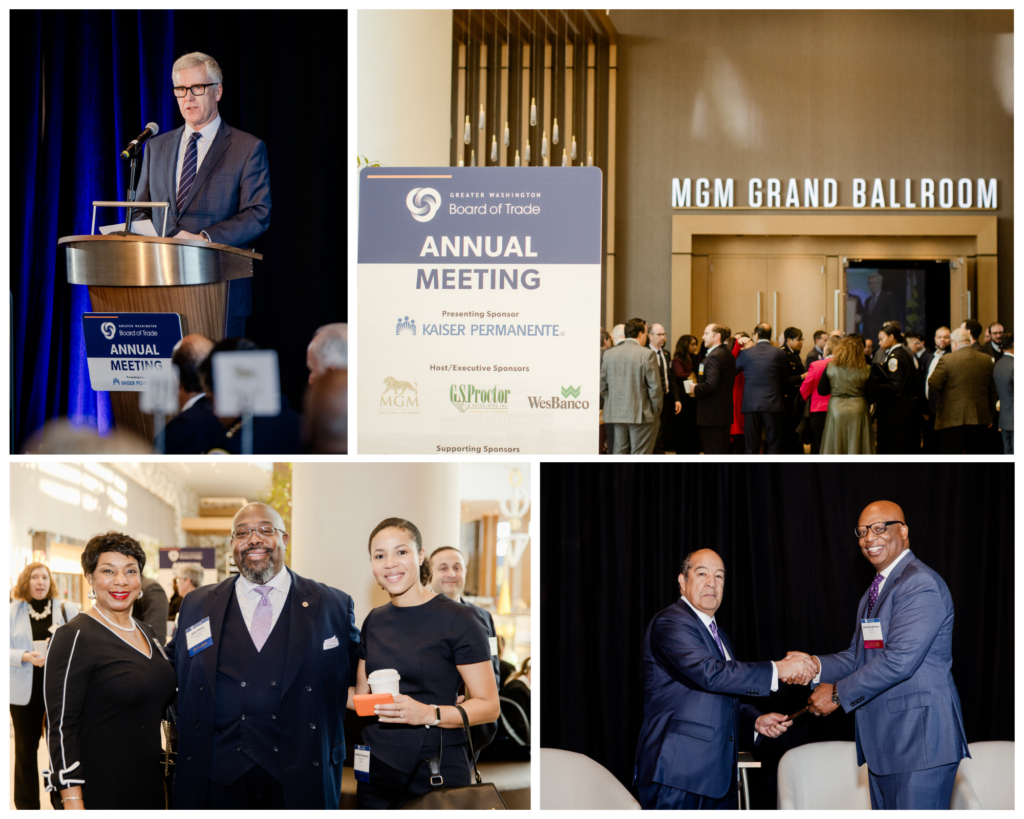
Click here to view more pictures from Annual Meeting
We also had the pleasure of hearing from Ruth Williams-Brinkley, President at Kaiser Permanente Mid Atlantic States, on the great work Kaiser is doing to build healthy communities in our region before handing the discussion off to Deborah Rutter, President of The John F. Kennedy Center for the Performing Arts, who introduced the primary topic of conversation around the vital importance of the arts to the region, remarking on the enormous value of arts and culture for the region’s businesses, as well as the role that access to the arts plays in the mental and general wellbeing of the rest of the region’s communities.
In discussing what the region might look like without museums, arenas, theaters, and gathering spaces that shape the civic lives of residents, Deborah discussed a recent National Endowment for the Arts and Americans for the Arts poll in which 86% of respondents say that the arts vastly improve their lives in their communities and that arts in the non-profit sector make up a $13.8 Billion chunk of the DC economy and around $50 Billion regionally. Concluding that arts and entertainment are not luxuries but that they are necessary for prosperous communities, she mentioned some of the Kennedy Center’s community outreach work, including the National Symphony Orchestra’s ‘In Your Neighborhood’ program, which largely centers around bringing access to the arts to Ward 5 across non-traditional settings, and grassroots organizations participating in programs like the Cultural Caucus, which provides space and funding for local communities to curate the arts programming that they care about.
Deborah’s focus on art for non-art outcomes led to the presentation of a table read for playwright Niarra C Bell’s The Smiles Behind, a play born out of Enough: Plays to End Gun Violence, a program that asks teens to submit short works around gun violence and provides a platform for young artists.
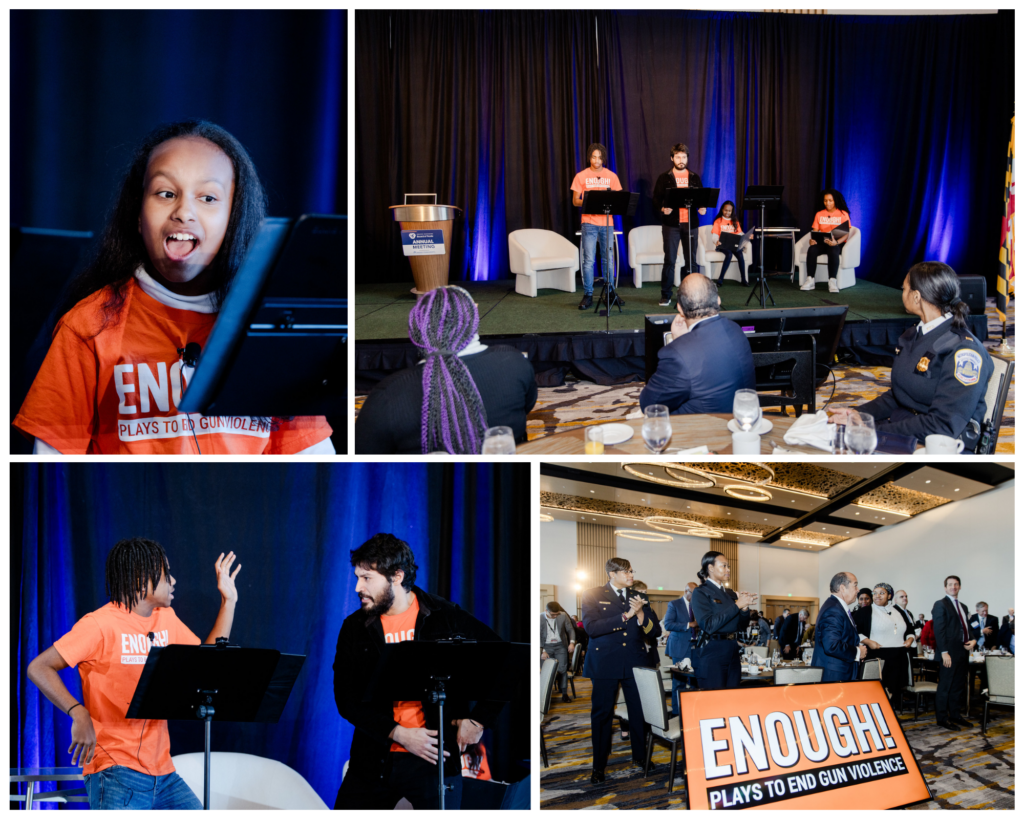
The performance was followed by a panel discussion in which Jack, Niarra, Deborah, and Chief Pamela Smith of the Metropolitan Police Department discussed violent crime in the region as contextualized by the play. Jack, moderating the panel, started the discussion with a personal anecdote about his experience with violent crime in the region before passing the discussion to the panelists. Chief Smith discussed her background, including how she came to be an integral part of the national law enforcement community and some of the broad impact that she has seen community-centric cooperative policing have on DC’s residents.
Deborah discussed her experiences with the large-scale defunding of arts education shortly after the start of her career. She reflected on the critical role that arts education and arts educators had on her life during her formative years before transitioning into a discussion of how the Kennedy Center represents a unique local and national platform for every form of art within the region and how its significant role has been an enormous part of the region’s cultural focus on the arts.
Niarra then discussed how increasing rates of gun violence can hit close to home in communities that aren’t expecting it and how such an instance led her to get involved with theater and later into arts advocacy and remarked on the importance of giving a platform to young voices as a part of the conversation about criminal justice reform.
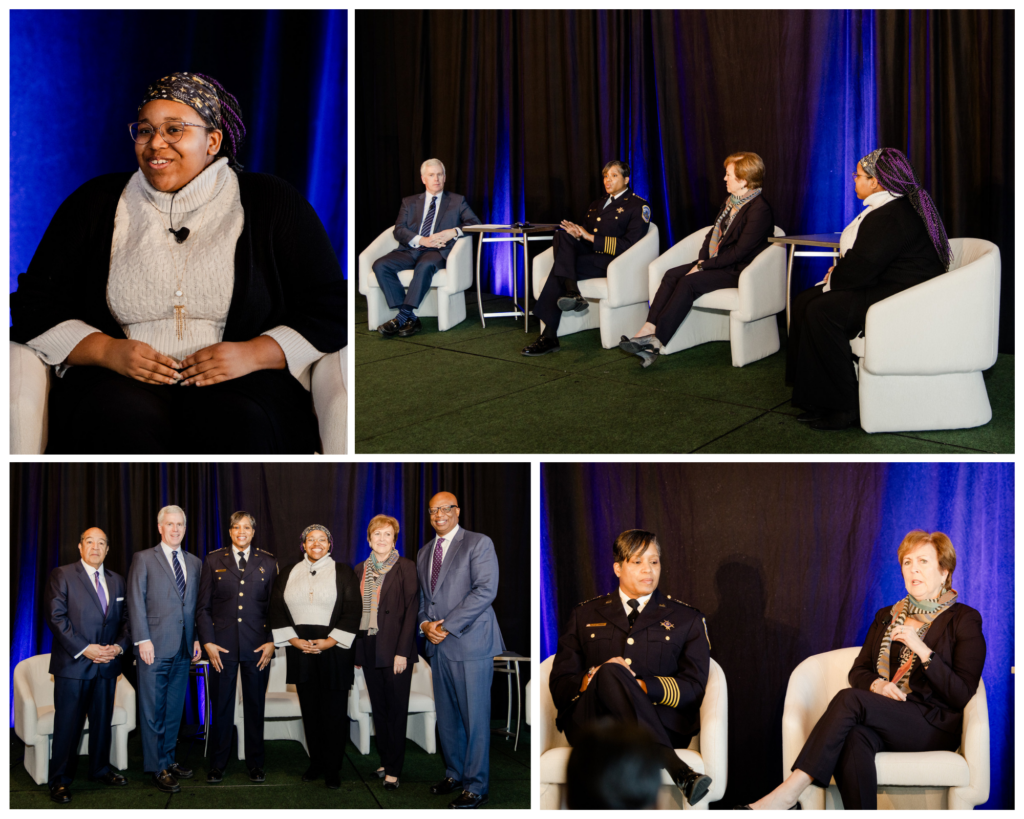
The conversation then shifted more toward violent crime prevention as Chief Smith expressed a desire to partner with the Kennedy Center to help educate new officers and create a more humane policing community by sharing art like The Smiles Behind with new officers. She went on to discuss the arrest of 10 juveniles involved in a carjacking ring (an alarming issue in the District) and the impact that new programs like Operation ATLAS and the District’s new gun trafficking unit have had since their creation on the crime rates in the region. Also, Chief Smith spoke about future programs like the District’s crime center, which will be reaching out to the region’s business community to provide CCTV access in concert with the Mayor’s plan to double the number of CCTVs in the District, a measure which has substantially reduced crime elsewherel. Chief Smith concluded by discussing the importance of holding youth accountable and avoiding a culture where juveniles feel untouchable by the law.
Niarra echoed Chief Smith’s sentiments about the necessity of holding juveniles accountable, further discussing how the lack of accountability can lead to many of the problems communities can experience wherein bystanders can be grouped in with bad actors before Deborah concluded the discussion by calling out Duke Ellington High School’s gun violence support group, recently featured in the Washington Post, as being an incredible example of community support of those impacted by the region’s pandemic of violent crime.
Thank you to all our members for contributing to the work of the Board of Trade that helps our region and business community to stay competitive, engaged, productive, and inclusive to all who live and visit!
In 2024, we anticipate fresh challenges coupled with abundant prospects. Drawing from our enduring legacy in this region, the Board of Trade is unwavering in its dedication to amplifying your achievements and bolstering our region’s competitiveness. We’ll advance this by nurturing stronger connections, advocating more powerfully across federal, state, and local arenas, conducting in-depth analyses, and rolling out specific programs and initiatives.
Stay up to date on Board of Trade events here: https://www.bot.org/events
Thank you to our sponsors for supporting our 2023 Annual Meeting and continuing your support for the Board of Trade and our vital work in the region:
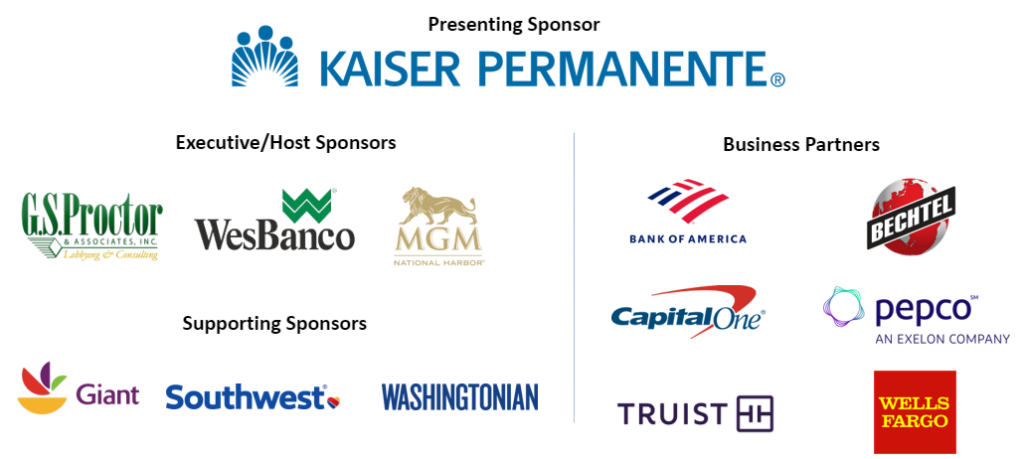
Greater Washington Board of Trade and Greater Washington Partnership Host 2023 Capital Region Transportation Forum focused on Future of Transportation and WMATA
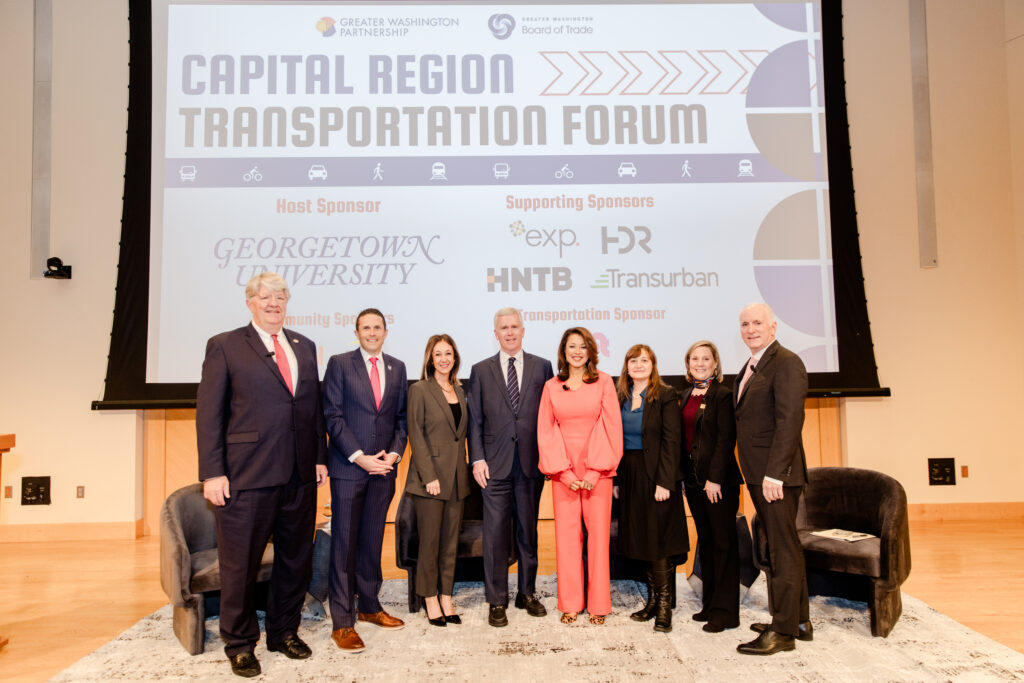
On November 30th, the Greater Washington Board of Trade (the Board of Trade) and the Greater Washington Partnership (the Partnership) hosted the 6th annual Capital Region Transportation Forum. This annual event brings together the Capital Region’s transportation leaders – from Washington D.C., Maryland, and Virginia – to discuss shared challenges and opportunities that require multi-jurisdiction collaboration. This year, the discussion centered around the Washington Metropolitan Area Transit Authority (WMATA) fiscal challenges and regional efforts to overcome them.
The Partnership and the Board of Trade work together to ensure the region is advancing comprehensive and strategic transportation investments that will keep our economy moving. An efficient, accessible, and reliable transportation system is essential to ensuring businesses and residents can thrive.
We kicked off the morning by celebrating many of the region’s transportation wins from the past year, including the relaunch of the Baltimore Red Line, Metro’s post-pandemic ridership recovery and historic levels of service, as well as record-breaking ridership on Virginia’s passenger trains. Most notably, WMATA’s $750 million operating budget deficit for the upcoming fiscal year, remains a major challenge facing the region and we urged leaders and elected officials to work together toward a sustainable solution.
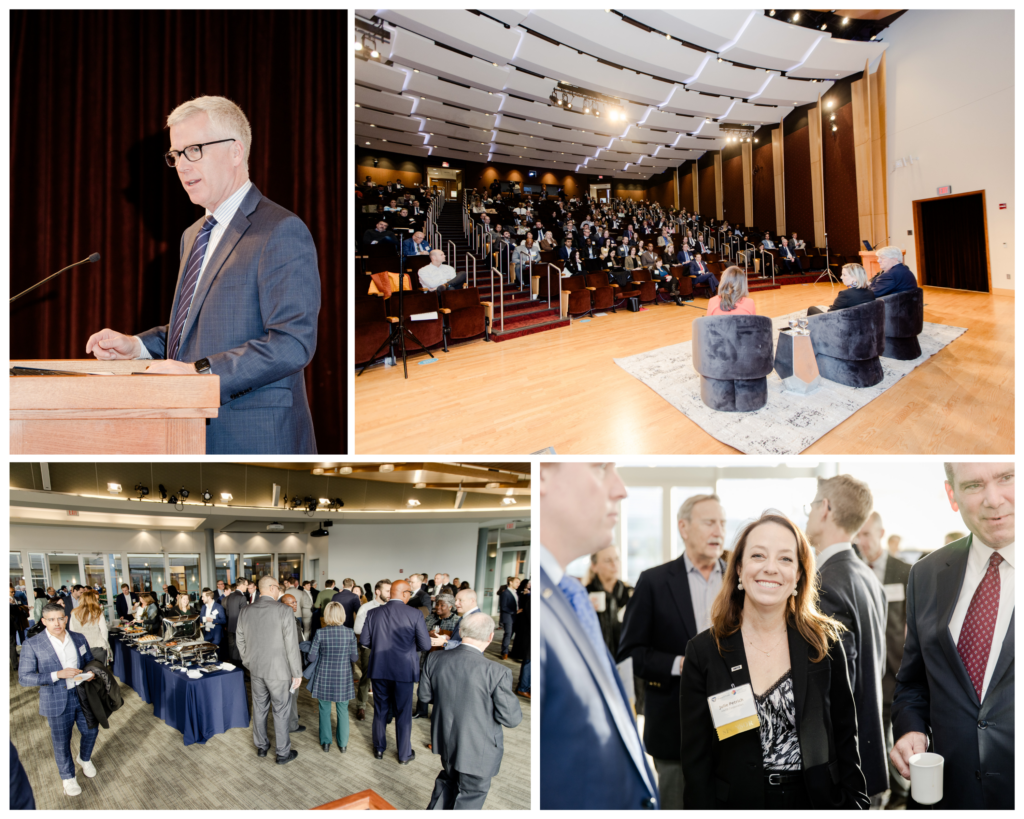
Charting the Path to Sustainable Mobility
The event opened with Dr. Cinzia Cirillo, who is a professor and the interim director of the Maryland Transportation Institute at the University of Maryland. Dr. Cirillo discussed recent research from the Maryland Transportation Institute regarding persistent traffic and congestion in the Greater Washington region despite the prevalence of remote work. She also shared the data science behind those insights, and how such models can be invaluable tools for decision makers going forward to forecast usage, expected impacts, and externalities of future infrastructure projects. “[Monitoring congestion] is not enough, because in order to make investments, we need to be able to predict the consequences of our actions, or no action,” Cirillo said.
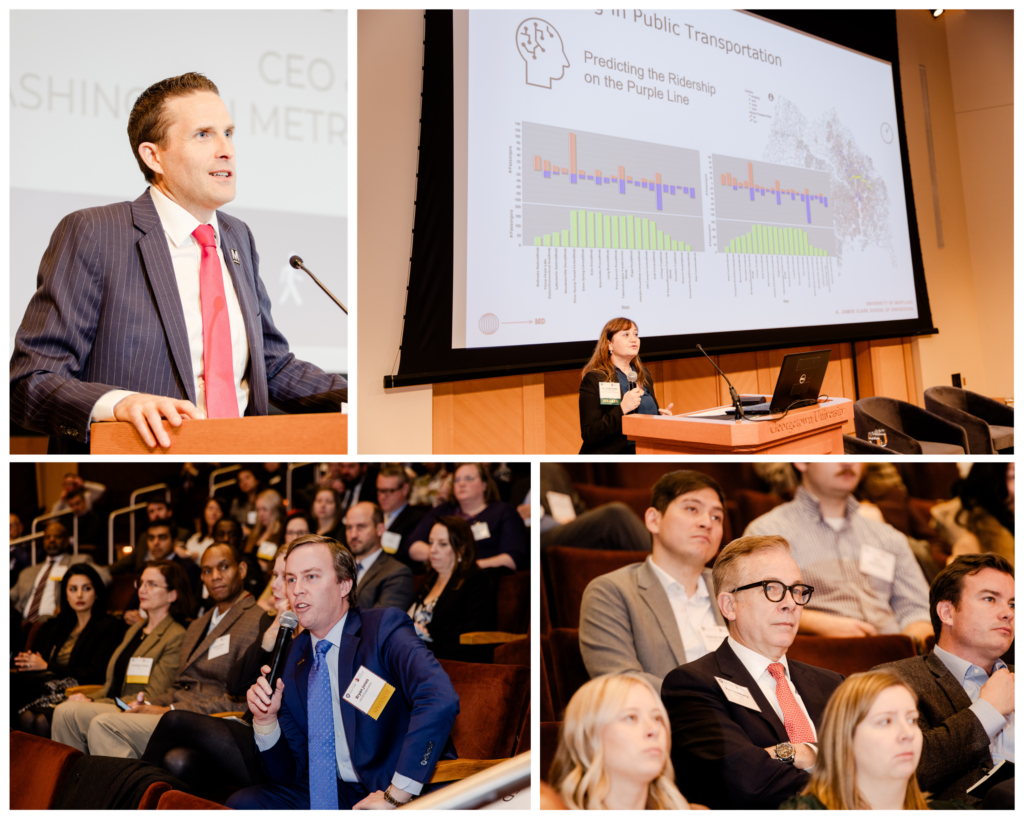
SEE MORE PICUTURES FROM OUR EVENT HERE
Randy Clarke: State of the Metro Address
Randy Clarke, the General Manager and CEO of WMATA, updated the audience on WMATA’s current financial crisis. The transit agency, which is facing a $750 million operating budget deficit, has been working toward reforms, cost savings, and service cuts to help bridge its funding gap. Clarke outlined the major factors contributing to the agency’s deficit, including decreased ridership post-pandemic, inflation, and the depletion of COVID subsidies. If a funding agreement is not defined in the coming weeks, the immediate consequences could include significant service cuts and layoffs. “The state of Metro is strong but highly uncertain. We need to choose as a region what we want Metro to be,” Clarke said.
Clarke presented various budget scenarios with the worst-case scenario requiring drastic cuts to bus and rail services, longer waiting times for commuters, the shutdown of numerous bus lines, and early shutdowns of the Metrorail system. Equally concerning is the huge number of WMATA employees that will face the prospect of layoffs and hiring freezes if funding is not secured. Layoff notifications and the hiring freeze could begin in January 2025, with impacts to service starting to show during DC’s busy cherry blossom season next spring.
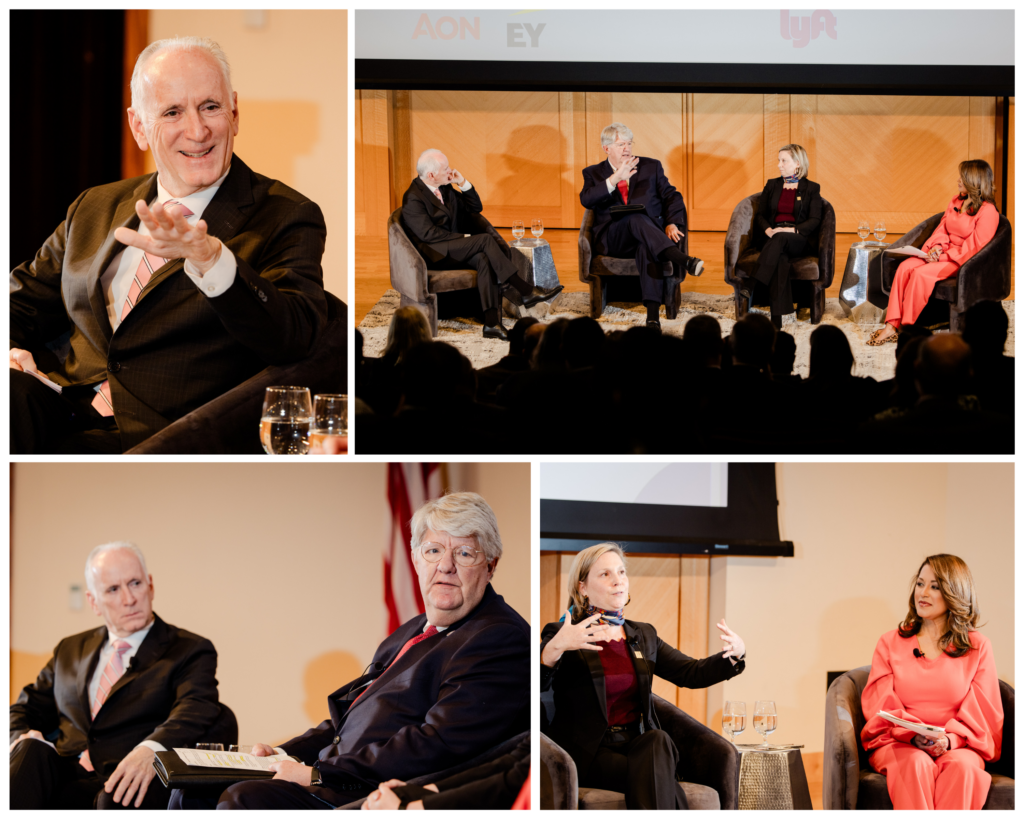
Panel: Regional Transportation Leaders Panel
A panel discussion, moderated by WUSA9 anchor Lesli Foster, brought together the transportation leaders from DC, Maryland, and Virginia to discuss recent progress and collaboration on regional transportation initiatives. The panelists, Virginia Secretary of Transportation W. Sheppard Miller III, Maryland Transportation Secretary Paul Wiedefeld, and Interim Director of the District Department of Transportation Sharon Kershbaum, shared insights on their administrations’ respective visions and shared regional priorities. Safety was stressed as a top priority across the region. All three secretaries emphasized their shared focus on reducing roadway injuries and fatalities. “We lost over 1,000 people last year on our roadways. The problem is that we’ve gotten used to that fact,” said Sheppard Miller III.
WMATA was another key concern and topic of discussion. The uncertain future of WMATA services, escalating costs, and impacts on service are creating instability across the region. “The importance of WMATA to Maryland and to the region cannot be overstated. It’s what makes us competitive nationally and internationally. We cannot let it fail, but we also have to work with our financial realities. We’re going to have to make some hard choices,” said Paul Wiedefeld. The panel explored how each administration is working to ensure stability for WMATA, its funding partners, and the broader community that relies on its services “WMATA’s survival is the District’s survival. The District is really trying to drive demand [for transit] because that is a lever that we have. Priority bus lanes have been key to that.” said Sharon Kershbaum.
The Partnership and the Board of Trade were honored to host 200 leaders to discuss foundational issues for our region’s ability to grow and thrive. Thank you to Lesli Foster for serving as our moderator, all our panelists and presenters, and a special thanks to this year’s sponsors: Georgetown University, EXP, HDR, HNTB, Transurban, Aon, EY, and Lyft. We will continue to convene and look for opportunities to partner with the leaders who joined us at the 2023 Capital Region Transportation Forum to ensure the region continues to make the long-term investments needed to ensure this region remains one of the best places to live, work, and build a business.
Watch the full 2023 Capital Region Transportation Forum here.
To watch and share clips from the 2023 Capital Region Transportation Forum, check out the below videos from our YouTube page:
WMATA (Metro) General Manager Randy Clarke discusses transit system’s $750 million funding gap
Capital Region transportation leaders discuss Metro funding and traffic congestion in DC, MD, and VA
Maryland Transportation Institute shares traffic research for the Greater Washington region
October policy dicussions engage Board of Trade members with regional labor leaders and state senators
GWBOT’s Regional Policy Leadership Series (RPLS) events bring together key policymakers and officials to discuss some of the most important issues facing the region’s business community. Last month, the Board of Trade and our partners held two policy conversations, one with regional labor leaders and another with Virginia and Maryland’s Senate Presidents. In each of these discussions, topics ranged from workforce, education, disruptive technology, and the future of both economic and environmental sustainability.
The first event was a labor-focused discussion expertly moderated by Mac Tisdale, President Mid-Atlantic Region at First National Bank. It brough together Sec. Portia Wu, Dr. Unique N. Morris-Hughes, and Sec. George Slater to discuss topics across the labor and workforce landscape, including workforce development and retention, labor environment, intraregional cooperation, and preparing the region for the future impacts of emerging technologies like AI before taking questions about the potential impacts of a government shutdown on the region’s labor market and economy. Fundamentally, the discussion centered around the notion that the Greater Washington region has one of the most educated workforces in the world and should be in a position to capitalize on the new disruptive technologies changing the national and global economic landscapes and what the region can do to maintain and expand the edge that it currently has in that sector.
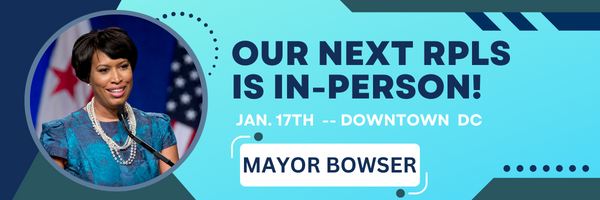
Our though-provoking moderator Steve Proctor, President and CEO of G.S. Proctor & Associates, led our next discussion, which engaged Senate Presidents Lucas and Ferguson on a broad range of topics spanning workforce and education, transit, economic and environmental sustainability, health and wellness, technology, and legislative priorities for Maryland and Virginia in the coming cycle, giving attendees a high-level view into what the upcoming legislative cycle is likely to bring for the region.
Perhaps the biggest take-away, though, was the common theme through the two sessions of collaboration between jurisdictions. Leaders in both sessions have expressed an understanding of the importance of interjurisdictional intraregional collaboration and signaled a desire to work with one another more closely. Connecting regional leaders and the business community is, in large part, the goal of this series and the opportunity to see, in real time, the beginnings of those conversations and for business leaders to take part in the discussion during Q and A time to shape the conversation is a huge step toward this goal.
If you were able to attend last month’s sessions, thank you for being a part of the conversations and helping to advance collaboration and cooperation within the region, and if you weren’t, make sure that you are able to attend future events so that you can be a party to the conversation going forward and as informed as possible about changes coming to the region’s policy landscape.
Want to learn more abou these RPLS discussions?
Learn more here: Regional Senate Presidents
Learn more here: Regional Labor Leaders
